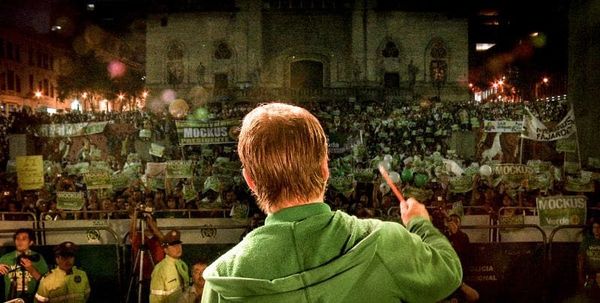Eye For Film >> Movies >> Life Is Sacred (2014) Film Review
Life Is Sacred
Reviewed by: Rebecca Naughten

Life is Sacred examines the 2010 presidential campaign of Antanas Mockus and its subsequent repercussions within Colombia's political landscape. Colombia has the world's longest-running armed conflict - the UN estimates that 220,000 people have been killed and more than five million displaced by it - at the same time that rampant drug production and endemic corruption have left the general population trapped in a cycle of violence. Maths and philosophy professor Mockus - formerly the Dean of the National University, and later the Mayor of Bogota - is an anti-establishment figure who publicly stands against violence and corruption, and idealistically calls for the future story of Colombia to be written in pencil rather than blood.
His idealism is a strength and a weakness. On the one hand, such was his commitment to eradicating corruption while he was mayor that he entirely disbanded the notoriously corrupt traffic police and replaced them with 400 mime artists (hilarity did, indeed, ensue). He also 'disarmed' Bogota (he didn't think that violence could subside if the general populace was armed) and managed to reduce the city's homicide rate by 70 per cent - although his methods were out of the ordinary, they got results. On the other hand, his admirable belief in running a non-aggressive, positive and entirely clean campaign makes him appear naive when the opposition (the incumbents) - startled by Mockus's success in the polls - begin a dirty tricks campaign of rumours and propagated falsehoods, making full use of the machinery of the State in order to generate fear within the poorer sections of Colombian society.

Instead of an outsider's perspective of events, or aligning with Mockus's point of view, director Andreas Dalsgaard makes the film's voiceover that of a third party who is personally invested in what we see on screen - Katherine Miranda, the 22-year-old who Mockus put in charge of co-ordinating the Green Party's youth supporters. Thus, via the voiceover, we gain both an insight into why Mockus so inspired the younger generation and the sense of disillusionment that blooms when he fails to challenge what seems to be blatant electoral fraud (for fear of undermining official institutions further).
This youthful perspective shapes how Dalsgaard divides the film into two parts - hope (the campaign) and peace (the aftermath). The second half shows that the director played the long game by returning a year later once the dust had settled, and then again in 2014 for the next set of presidential elections. One year on, Mockus - who has been diagnosed with Parkinson's - is a shadow of his former self, unsure about daily decisions and constantly second-guessing his actions from the end of the campaign. He seems genuinely anguished by the idea that perhaps he made no difference to the way politics is conducted in Colombia, or failed to shift the parameters of the national debate.
However Katherine's voiceover indicates that positive things did come out of what is known as the 'Green Wave' of 2010 - the network of organisation and a feeling of togetherness for those who took part. But by 2014 something more extraordinary had happened in terms of how the ultraconservative candidate who beat Mockus - Juan Manuel Santos (formerly the minister of defence) - actually conducted himself in office. It is within this shifting political landscape that Katherine spots the possibility of reigniting Mockus's positive message and teachings.
Although the second half of Life Is Sacred starts at a low ebb, it builds to a hopeful and cathartic finale where Mockus - a highly intelligent man who is more than aware of what Parkinson's disease is progressively robbing him of - is shown that he did make a difference and that some of the seeds he planted in 2010 grew well beyond his inner circle. Likewise, rather than allowing the country to remain locked in a cycle of violence that benefits an elite few but guarantees misery for everyone else, the younger generation is shown to be prepared to engage in active but peaceful politics in order to change the system and the people working within it.
Reviewed on: 12 Mar 2015















